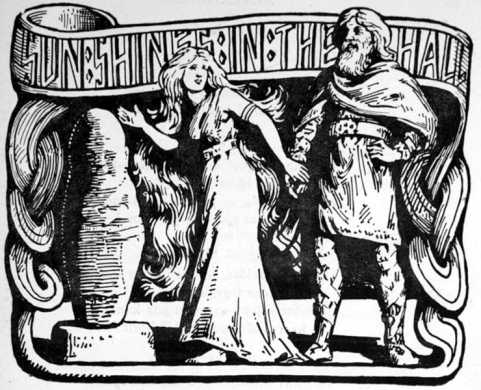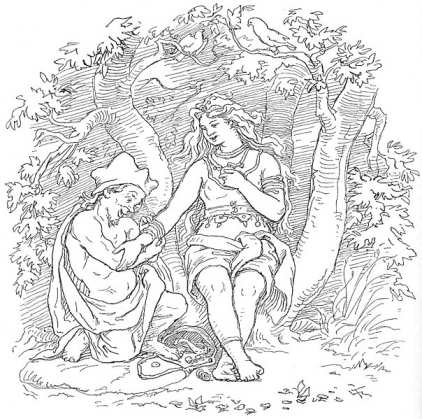The Alvíssmál is a story I found both funny as well as interesting for several reasons. Essentially the dwarf Alvíss comes to fetch his bride-to-be, Thrud, daughter of Thor, and Thor out-wits him. In the end, they have spoken for so long Alvíss is caught out in the sun and turns to stone.
This is a pretty short and straight forward poem, clearly mostly entertaining, but also full of facts. In my view, it also shines an interesting light on the similarites of the Dwarves and the jotnar. They seem to both have been the source of how we see what we call trolls today.
When and why was Thrud promised to Alvis?
This question of a promise made is not disputed by Thor. However today we have no knowledge of when it was made, or what Alvis did in return. It is simply one of those facts that is forever lost in time.
Thrud is quite obviously a beautiful maiden, the daughter of Sif, and possibly she is a Valkyrie even. Also, as Alvis has apparently demanded her hand in marriage as payment, it supports her being quite pretty.
As Thor points out, he is her father and the only god who can give her away. As sort of a compromise, they agree that Alvis shall get what he wants if he can answer Thor’s questions.
Alvis turns to stone

Every Norwegian child knows that trolls turn to stone in sunlight. This is sometimes true in the Old Norse poems as well, and in this case, also applies to dwarves.
This inability to be in direct sunlight doesn’t always seem to apply though, not for jotnar or dwarves. One jötun, Hrungnir, is even made out of stone, as we learn in the story of Thor’s Duel with Hrungnir.
Lost knowledge about Thrud
Speaking of Hrungnir, I want to mention an old poem called Ragnarsdrápa. It was written in the 9th century and is not complete. It is seen as maybe the oldest surviving piece of skaldic poetry today.
In the first verse of Ragnarsdrápa, a reference is made to the Jötun Hrungnir, using the kenning “the thief of Thrud”. That Hrungnir at some point might have kidnapped Thrud should come as no surprise, but it is wholly unknown. This is a story that hasn’t survived through the ages. Much like discussed above regarding why Thrud was promised to Alvis, knowledge about the central characters is lost.
This bears a lot of resemblance with another poem also from the Poetic Edda. In the Lokasenna Loki insults all the gods for sins, perceived or real, they apparently have committed. However, most of these older events alluded to are unknown to us today.
In order to enjoy stories from Norse mythology it will serve you well to remember it. We will never know all the stories so sometimes there might be things that don’t entirely make sense. Not to forget, they also come from a culture and time distinctly different from ours, to put it mildly.
Alvíssmál
Adapted by myself from the 1865 translation by Benjamin Thorpe.

Alvis:
The benches they are preparing, now the bride will come with me. It will be clear to everyone that I have rushed beyond my strength. Nothing will disturb my peace at home.
Thor:
Who are you? Why are you so pale around the nose? Did you sleep last night among corpses? You look like one of the jötnar. You are not fit to take a bride.
Alvis:
My name is Alvis, I live beneath the earth and have a home under the rock. I am the lord of chariots, and I have come to visit. A promise once made should not be broken by anyone.
Thor:
I will break it; for I have power over the maiden as her father. I was not home when the promise was made to you. The only one who can give her away among the gods is me.
Alvis:
Who is this man, who claims power over that fair and bright maiden? Very few will know you for your far-reaching arrows. Who has given you bracelets?
Thor:
My name is Thor, I have traveled far and wide; I am the son of Sidgrani (Odin). You will not have that young maiden nor that union without my consent.
Alvis:
I would like your consent and to have that union. I would rather have her than not have that snow-white maiden.
Thor:
The maiden’s love shall not, wise guest! be denied to you, if you can tell me everything I want to know about every world.
Alvis:
Thor! You can try to prove your knowledge of the dwarf. I have traveled over all the nine worlds and know every being.
Thor:
Tell me, Alvis!—for I presume you, dwarf, to know all men’s concerns—what is the name of the earth that lies before men in every world.
Alvis:
It is called Jord among men, but Asgarth with the gods; the Vanir call it Vé, the Jotuns Jötunheimr, the elves Alfheimr, and the supreme powers call it Asgard.
Thor:
Tell me, Alvis, —for I presume you, dwarf, to know all men’s concerns— what is the name of the heaven that is visible in every world.
Alvis:
Men call it Himinn, but the gods call it Hliðskjálf; the Vanir call it Vindheimr, the Jotuns Jötunheimr, the elves Fagrheimr, the dwarfs call it Dura salr.
Thor:
Tell me, Alvis! —for I presume you, dwarf, to know all men’s concerns—what is the name of the moon that men see in every world.
Alvis:
Men call it Mani, but the gods call it Máni; the dead call it Hvergelmir, the Jotuns Skíðblaðnir, and the dwarfs call it Skinfaxi; the elves call it Alsvartr.
Thor:
Tell me, Alvis! —for I presume you, dwarf, to know all men’s concerns—what is the name of the sun that men’s sons see in every world.
Alvis:
Men call it Sol, but the gods call it Sól; the dwarfs call it Dvalin’s toy, the Jotuns call it Glóin, the elves call it Fagrblinkr, the sons of the Aesir call it Alsviðr.
Thor:
Tell me, Alvis, —for I presume you, dwarf, to know all men’s concerns— what is the name of the clouds that mix with showers in every world.
Alvis:
Men call them sky, but the gods call them Skur; the Vanir call them Vindflóð, the Jotuns Urð, the elves Vetrmagn, in Hel they are called Hálm Hulðar.
Thor:
Tell me, Alvis! —for I presume you, dwarf, to know all men’s concerns—what is the name of the wind that passes over every world.
Alvis:
Men call it wind, but the gods call it Vindr; the wide-ruling powers call it Gneggiudr, the dwarfs call it Hlær, the Jotuns call it Hrafn, the elves call it Vindfari.
Thor:
Tell me, Alvis! For I presume you, dwarf, to know all men’s concerns. What is the name of the peace that rests in every world?
Alvis:
Men call it “Logn,” but the gods call it “Lægi.” The Vanir call it “Vindslot,” the Jotuns “Ofhly,” the Alfar “Dagsevi,” and the Dwarfs “Dags vera.”
Thor:
Tell me, Alvis! For I presume you, dwarf, to know all men’s concerns. What is the name of the sea that men row over in every world?
Alvis:
Men call it “Sær,” but the gods call it “Silægia.” The Vanir call it “Vagr,” the Jotuns “Alheimr,” the Alfar “Lagastafr,” and the Dwarfs “Diupan mar.”
Thor:
Tell me, Alvis! For I presume you, dwarf, to know all men’s concerns. What is the name of the fire that burns before men’s sons in every world?
Alvis:
Men call it “Eldr,” but the Æsir call it “Funi.” The Vanir call it “Vagr,” the Jotuns “Frekr,” but the Dwarfs call it “Forbrennir,” and in Hel they call it “Hrodudr.”
Thor:
Tell me, Alvis! For I presume you, dwarf, to know all men’s concerns. What is the name of the forest that grows for the sons of men in every world?
Alvis:
Men call it “Vidr,” but the gods call it “Vallarfax.” Hel’s inmates call it “Hlidthangr,” the Jotuns “Eldi,” the Alfar “Fagrlimi,” and the Vanir call it “Vondr.”
Thor:
Tell me, Alvis! For I presume you, dwarf, to know all men’s concerns. What is the name of the night, which Norvi’s daughter is known as, in every world?
Alvis:
Men call it “Nott,” but the gods call it “Niol.” The wide-ruling powers call it “Grima,” the Jotuns “Olios,” the Alfar “Svefngaman,” and the Dwarfs call it “Draumniorunn.”
Thor:
Tell me, Alvis! For I presume you, dwarf, to know all men’s concerns. What is the name of the seed that the sons of men sow in every world?
Alvis:
Men call it “Bygg,” but the gods call it “Barr.” The Vanir call it “Vaxtr,” the Jotuns “Æti,” the Alfar “Lagastafr,” and in Hel it’s called “Hnipinn.”
Thor:
Tell me, Alvis! For I presume you, dwarf, to know all men’s concerns. What is the name of the beer that the sons of men drink in every world?
Alvis:
Men call it “Ol,” but the Æsir call it “Biorr.” The Vanir call it “Veig,” “Hreina logr” the Jotuns, but in Hel it’s called “Miodr”, Suttung’s sons call it “Sumbl”.
Thor:
I have never found more ancient lore in one breast. You have been deluded by great wiles, I tell you. You are above ground, dwarf! at dawn; already in the hall the sun is shining!
Featured Image Credit: W.G. Collingwood (1854 – 1932), Public domain, via Wikimedia Commons
